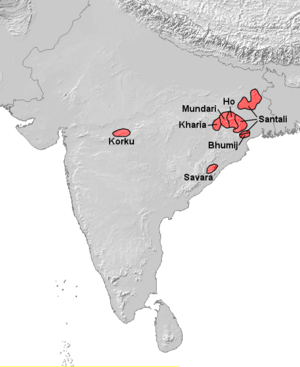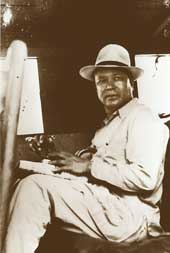Munda people
 Dialects spoken by the Munda people | |
| Total population | |
|---|---|
| 9 million (estimated) | |
| Regions with significant populations | |
| India | 9,000,000[2] |
| Bangladesh | 142,000[3] |
| Nepal | 1,900 |
| Bhutan | 1,800 |
| United States | 500[4] |
| Languages | |
| Religion | |
| |
| Related ethnic groups | |
| |
The Munda people are an Adivasi ethnic group who originated in the Chota Nagpur Plateau region of north-east India. They originally spoke the Munda language, which belongs to the Munda subgroup of Austroasiatic languages. The Munda are found across Jharkhand and in adjacent parts of Assam, Odisha, West Bengal, Chhattisgarh, Bihar and portions of Bangladesh. The group is one of India's largest tribes.
A research study of W. Schmidt suggests that Munda people or Austroasiatic people (Mundari, Ho, Santali, Kharia and others) speakers in India had their center in South-east Asia. According to the Eastern Route Theory or Austric Theory of Migration, the Munda people or Austroasiatic people came to India on an eastern route from South-China via Burma and Assam, possibly from Java, Sumatra, Bornia (Burunai), Island (Bandadipa) and Jambudwip (Jambudipa) where they inhabited in pre-historic period. In course of time, they migrated in the region of the river Sindhu and down towards Bindhyachal and then to the Chhotanagpur Plateaus long before the advent of Aryans and Dravidians in the Indian subcontinent.[5],[6],[7]
Munda people in Tripura are also known as Mura, and in Madhya Pradesh they are often called Mudas. Their late-20th-century population was estimated at nine million.[8]
Culture
The Munda people probably descended from Austroasiatic migrants from southeast Asia.[9] Nomadic hunters in the India tribal belt, they became farmers who were employed in basketwork and weaving. With the listing of the Munda people as part of the Scheduled Tribes (Adivasi), many are employed in various governmental organizations (particularly Indian Railways).[10]
Munda religion is a blend of Sarnaism and Christianity, and they are not the part of the Indian caste system. Although the Mundas have preserved much of their pre-Christian culture, they have absorbed a number of Christian traditions. They have many folk songs, dances, tales and traditional musical instruments. Both sexes participate in dances at social events and festivals. The naqareh is a principal musical instrument.
The Munda people have elaborate rituals to celebrate birth, death, engagement and marriage. The birth of a boy is celebrated as an earner for the family, and the birth of a girl is celebrated as a family caretaker. Lota-pani is the engagement ceremony. Dali Takka, a monetary gift to paternal guardians, is generally paid before the marriage. Marriage, considered one of the main rituals of life, is a week-long festivity.
An ointment of scented oil and turmeric is applied to the face and body after death. Widow marriage is common. The Munda people are patrilineal, patrilocal and patriarchal.[11]
Involved in agriculture, the Munda people celebrate the seasonal festivals of Mage, Phagu, Karam, Sarhul and Sohrai. Some seasonal festivals have coincided with religious festivals, but their original meaning remains.[12]
Notable Austroasiatic Munda people

- Ram Dayal Munda: Scholar and musicologist who received the Padma Shri
- Jabra Munda: Killed in the 2016 Uri attack[13][14]
- Birsa Munda: Late-19th-century freedom fighter[15]
- Jaipal Singh: Olympic gold medalist in field hockey and member of constituent assembly.
- Kariya Munda: Deputy Speaker of the 15th Lok Sabha
- Frida Topno: Politician from Odisha
- Tulasi Munda: Social Activist from Odisha
- Anuj Lugun: Poet who received the 2011 Bharat Bhushan Agarwal Award[16]
- M. M. Mundu: Recipient of the 2011 Bhasha Samman Award from the Sahitya Akademi[17]
- Jacinta Kerketta: Author and recipient of the 2014 Ravishankar Upadhyay Smriti Kavita Puraskaar Award[18][19]
- Rohidas Singh Nag: Inventor of the Mundari Bani script[20]
- Lako Bodra - Inventor of Varang kshiti script[21]
- Amrit Lugun: Ambassador to Yemen[22] and a South Asian Association for Regional Cooperation director[23]
- Rajeev Topno: Private secretary to Prime Minister of India Narendra Modi[24]
- Priyanka Kerketta: Track and field athlete[25]
- Masira Surin: Member of the gold-medal Indian female field-hockey team at the 2002 Commonwealth Games
- Manohar Topno: Played field hockey for India at the 1984 Summer Olympics[26]
- Prakash Munda: First-class cricketer who was the first tribal player on the Jharkhand team[27]
- Lal Mohan Hansda: Footballer
- Sanjay Balmuchu: Footballer[28]
- Munmun Lugun: Footballer[29]
- Arjun Tudu: Footballer[30]
- Mangal Singh Champia: [31]
- Jauna Murmu: Double gold medalist at the 12th 2016 South Asian Games[32]
- Jhanu Hansda: World-record-holding archer[33]
- Purnima Hembram
Literature and studies
Jesuit priest John-Baptist Hoffmann (1857–1928) studied the language, customs, religion and life of the Munda people, publishing the first Mundari language grammar in 1903. With the help of Menas Orea, Hoffmann published the 15-volume Encyclopaedia mundarica. The first edition was published posthumously in 1937, and a third edition was published in 1976. The Mundas and Their Country, by S. C. Roy, was published in 1912. Adidharam (Hindi:आदि धर्म) by Ram Dayal Munda and Ratan Singh Manki, in Mundari with a Hindi translation, describes Munda rituals and customs.[34]
Bibliography
- Hoffmann, John-Baptist: Mundari Grammar, Calcutta, 1903.
- Hoffmann, John-Baptist: A Mundari Grammar with exercises, 2 vols., Calcutta, 1905–09.
- Hoffmann, John-Baptist: Encyclopaedia mundarica, 15 vol., Patna, 1930–37.
- Ponette, P. (ed): The Munda World. Hoffmann commemoration volume, Ranchi, 1978.
See also
References
- ↑ [Ancient History by RS SHARMA.
- ↑ Indian Census. Censusindia.gov.in (14 May 2012).
- ↑ "Munda in Bangladesh". Retrieved 29 January 2016.
- ↑ "Joshua Project - Munda Ethnic People in all Countries".
- ↑ research study of W. Schmidt
- ↑ Eastern Route Theory or Austric Theory of Migration
- ↑ Ancient History by R.S Sharma Page 1-4.
- ↑ "Munda", Encyclopædia Britannica
- ↑ Riccio et al. (2011), The Austroasiatic Munda population from India and Its enigmatic origin: a HLA diversity study.
- ↑ "List of Schedule Castes". Ministry of Social Justice and Empowerment, Government of India. 2011. Archived from the original on 23 September 2014.
- ↑ Bhatt, Shankarlal C. (2006-01-01). Land and People of Indian States and Union Territories: In 36 Volumes. Jharkhand. Gyan Publishing House. ISBN 9788178353685.
- ↑ "Mundas, Munda Tribe in Jharkhand India, Occupation of Mundas". www.ecoindia.com. Retrieved 2016-03-26.
- ↑ "THOSE WHO FELL AT URI".
- ↑ "उरी में शहीद जवरा मुंडा का खूंटी स्थित गांव शोक में डूबा, पत्नी की तबियत बिगड़ी - Hindustan".
- ↑ "birsamunda". www.tribalzone.net. Retrieved 2016-03-26.
- ↑ "Hindi stalwarts praise tribal poet". in.news.yahoo.com. Retrieved 2016-03-26.
- ↑ "..:: SAHITYA : Akademi Awards ::..".
- ↑ AIPP. "Asia Indigenous Peoples Pact (AIPP) Announces Recipients for the 2014 Indigenous Voices in Asia (IVA) Regional Award". AIPP: Asia Indigenous Peoples Pact. Archived from the original on 4 March 2016. Retrieved 2016-03-26.
- ↑ "In Brief". www.dailypioneer.com. Retrieved 2016-03-26.
- ↑ "BMS to intensify agitation on Mundari language". www.oneindia.com. Retrieved 2016-03-26.
- ↑ http://www.avenuemail.in/region/tata-steel-celebrated-international-day-worlds-indigenous-peoples/96675/
- ↑ "Sorry for the inconvenience.".
- ↑ "Archived copy". Archived from the original on 3 April 2015. Retrieved 23 January 2015.
- ↑ "Rajiv Topno appointed Modi's private secretary". The Times of India. 19 June 2014. Retrieved 7 July 2014.
- ↑ "Profile of Priyanka KERKETTA - All-Athletics.com".
- ↑ "Manohar Topno". Sports-reference.com. Archived from the original on 14 December 2012. Retrieved 24 February 2017.
- ↑ "First tribal player in state Ranji squad". telegraphindia.com. Retrieved 24 February 2017.
- ↑ Kapadia, Novy. "Silver Jubilee of Tata Football Academy". SportsKeeda. Retrieved 5 January 2013.
- ↑ "M. Lugun". Soccerway. Retrieved 24 February 2017.
- ↑ "The Hindu : Sport / Football : Hat-trick by Arjun Tudu".
- ↑ timesofindia.indiatimes.com/sports/more-sports/Mangal-Singh-Champia-earns-Olympic-berth-India-in-medal-hunt/articleshow
- ↑ "Johar Times". Johar Times. Retrieved 2016-03-26.
- ↑ "Archer Jhanu Hansda breaks world record". rediff.com. Retrieved 2016-03-26.
- ↑ "Mundari: The Language of Munda Tribe".
Further reading
- Parkin, R. (1992). The Munda of central India: an account of their social organization. Delhi: Oxford University Press. ISBN 0-19-563029-7
External links
| Wikimedia Commons has media related to Munda people. |
- Sarna – A case study in religion On the religion of the Munda tribals
- Sinlung – Indian tribes
-
 "Mundās". Encyclopædia Britannica. 18 (11th ed.). 1911. This article is a discussion of the related family of languages.
"Mundās". Encyclopædia Britannica. 18 (11th ed.). 1911. This article is a discussion of the related family of languages. - http://projekt.ht.lu.se/rwaai RWAAI (Repository and Workspace for Austroasiatic Intangible Heritage)
- http://hdl.handle.net/10050/00-0000-0000-0003-A6AA-C@view Mundari language in RWAAI Digital Archive
